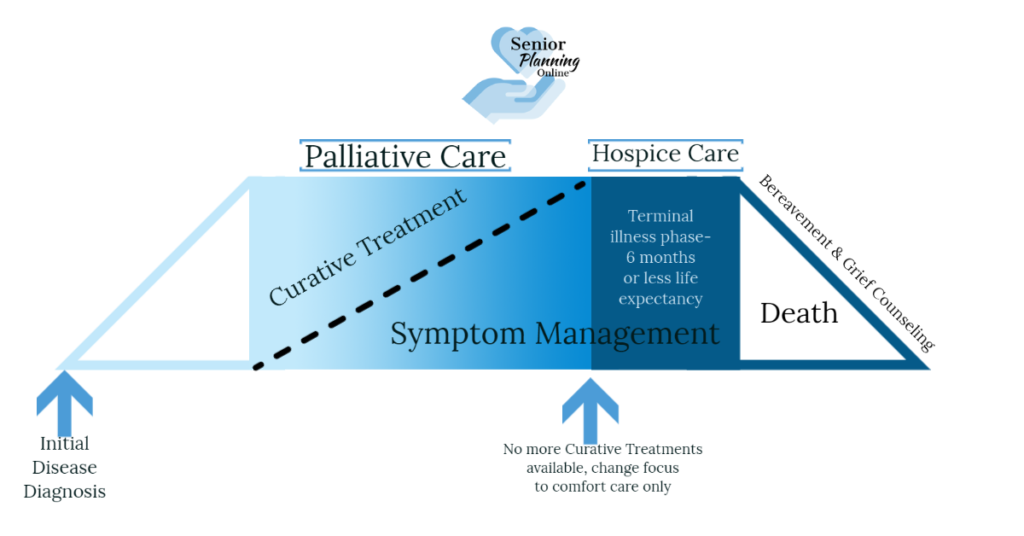There is so much confusion surrounding palliative care vs hospice care. Both have similar goals which makes it difficult for patients, families and even healthcare professionals to differentiate between the two.
I’m going to walk you through what palliative care is and how it differs from hospice care. I’ll discuss what palliative care is, how to qualify for the services, what services are included in palliative care and how it is paid for.
My end goal is to help you have a better understanding of what both are so you can make the best decision for either you or your loved one.
For a better understanding of what Hospice care is, you can look out for our upcoming post “What is Hospice and What are the Benefits?

What is Palliative Care?
Palliative care is specialized medical care designed to relieve symptoms and stress of a serious illness, and improve quality of life for the patient and their families.
Palliative consists of a team of physicians, nurse practioners/physician assistants, nurses, social workers and sometimes chaplains. They focus on managing symptoms of the illness, increasing quality of life and assisting with advance care planning. You can receive these services if you have a progressive or chronic illness. You do not need a terminal diagnosis to receive palliative care services. This is a misconception.
The palliative care team works with your existing provider or medical team to help manage symptoms, guide them through the process of the illness and what to expect, as well as helping them learn how to manage the stress and anxiety that come along with the illness. The goal is to help the patient and family live the best quality of life while dealing with the illness.

Who Qualifies for Palliative Care?
Anyone who is diagnosed with a serious progressive illness or a chronic illness can qualify for palliative care services. You just need to ask your physician, nurse practitioner or physician’s assistant for a palliative care consult.
Progressive means that the symptoms of the illness worsen over time.
Progressive illness can include:
Alzheimer’s disease, COPD, ALS (Lou Gehrig’s disease), Cystic fibrosis, Huntington’s disease, Multiple Sclerosis, Marfan syndrome, Muscular dystrophy, Kennedy’s disease, Parkinson’s disease.
Please note that this is not a complete list of progressive illnesses but examples of the most common ones.
Chronic means that the illness or disease persists over time. Typically the term chronic means the disease and the symptoms of the illness last longer than 3 months.
Chronic illnesses can include the progressive illnesses listed above. Some additional diseases or illnesses that are considered chronic can be: Cancer, heart failure, kidney failure, and sickle cell anemia to name a few.

What does Palliative Care Do?
Palliative care is beneficial as soon as someone is diagnosed with a serious illness. It is not intended to be used for someone who is already at the end-stages of their serious illness and who no longer have curative options.
Palliative care should be used as a support system for someone with a chronic and progressive diagnosis.
The palliative care team will sit down with the patient and their family and educate them on what the diagnosis is, the symptoms and progression of the illness and review what their treatment options are.
Goals of Care and Advance Care Planning
In addition, the team will talk with them about what goals they have for their life moving on and goals they have with their treatment. Discussing and clarifying these goals, can help the patient and family plan for all possible outcomes of the illness which can help them feel less stressed.
Advance care planning is a very important topic to discuss with patients and families with a new diagnosis. Check out our post on “Advance Directives” for more information on what is included in Advance care planning.
Home health services
Palliative care may also team up with a home health care agency to encompass a full-wellness approach. The home health company’s role is to provide physical therapy, occupational therapy and speech therapy in either a progressive or restorative role.
In other words, as you are continuing to seek treatment options for your illness, working with physical therapy and/or occupational therapy, etc may help you maintain your strength.
Sometimes treatment can weaken the body and it’s helpful for additional support to ensure you either regain your strength quickly or maintain your body’s current strength.
If you would like to know more about what home health care is, check out our post on “home health care services”.
Symptom Management
Symptom management is the main goal of both Palliative care and hospice care. Which is why people confuse the two different services.
Palliative care’s approach is to help manage your symptoms in a way that can support you as you continuously seek curative treatment options.
They offer pain management. Medications and support for any feelings of anxiety or depression the person may be experiencing can also be offered. In addition, medications to assist with nausea, vomiting, appetite issues, sleeping or even shortness of breath are available with palliative care. These are just some of the examples of symptoms they can help manage.
Education and Support
A palliative care team typically has a social worker who can work with the patient and their families on continuous education about their illness and progress. They are there to provide emotional support and counseling.
Palliative social workers will check in with the patient and family members about their understanding of the illness progression and help them to re-evaluate their goals of care as needed.
Part of the social worker’s role is to help the patient and family alleviate and cope with stress that comes along with the illness. Sometimes this means just talking things out with someone, sometimes it means giving education and sometimes it means providing resources.
While discussing goals of care throughout their time in palliative care, social workers are able to offer emotional and financial resources.
Having a progressive or chronic serious illness can put a lot of stress on an individual and their family. Bills add up, there is often loss of work and increased financial burden. Social workers have the tools to help alleviate some of that stress, at least for a time.
They can help with medicaid applications, applications for social security and medicare, setting up advanced care planning documents, etc.
Where Can You Receive Palliative Care?
You can receive palliative care services within your home, in an outpatient clinic setting or if you reside in a nursing home.
When looking into a palliative care agency, you will need to ask them if they provide home palliative care services or if they only provide the care in an outpatient clinic. Most palliative care agencies can provide home palliative care.
Many individuals living in a nursing home setting can also receive palliative care services. The palliative care team works in conjunction alongside the individual’s nursing home team and doctor. The palliative care physician, physician’s assistant or nurse practitioner can make recommendations to the nursing home physician on ways to alleviate symptoms and improve the individual’s quality of life.

Who Pays for Palliative Care?
Most commercial insurance companies offer a palliative care program or will pay for one.
If the patient has Medicare or a Medicare replacement plan, palliative care services are covered under the patient’s Medicare part A plan.
The palliative care provider will bill the patient’s Medicare part A plan and the patient should incur no out of pocket costs.
If a patient does not have commercial insurance or medicare, they likely have Medicaid through their state or can apply to receive Medicaid. Palliative care is covered 100% by Medicaid as well.
Ultimately, no matter the insurance plan someone may have, most of the time it is covered fully. I would still suggest you call your health insurance plan to ensure you have a palliative care benefit in your plan. Always double check to make sure there is no cost to the patient.
If you are looking for a palliative care agency in your area, you can ask your local hospital, physician’s office or check out Medicare.gov’s website: “Find Healthcare Provider“. Then select your location, you will want to select the type of service as “Hospice” (I know, confusing) because they tend to work within the same company. The list that you will be shown will be both hospice agencies and agencies that provide palliative care services additionally.
The Bottom Line
Palliative care is not the same as hospice care. Although they can be used to compliment one another, their approaches are very different. Palliative care’s goal is to help with symptom management and provide comfort while the patient is still seeking curative treatment options.
On the other hand, Hospice manages symptoms and comfort when the patient is no longer seeking curative measures. They may not have any curative options left or no longer feel the benefit of them. They are ready to head into the end-stage of life. We will address more about Hospice Care in our next post.
Both options are paid for by Medicare in different ways. Additionally, their services and approaches to care are slightly different. And there are criteria that must be met to qualify for palliative care and hospice.


One response
This is a very interesting read! As someone who has had close family members in palliative care it’s something that I grown to associate with end of life and I remember just passing a palliative care facility and found myself getting emotional just envisioning what the families inside must be going through, but now knowing my understanding had been tainted helps. This definitely helps me to understand it clearer and for sure will help others too. Thank you so much for sharing your knowledge